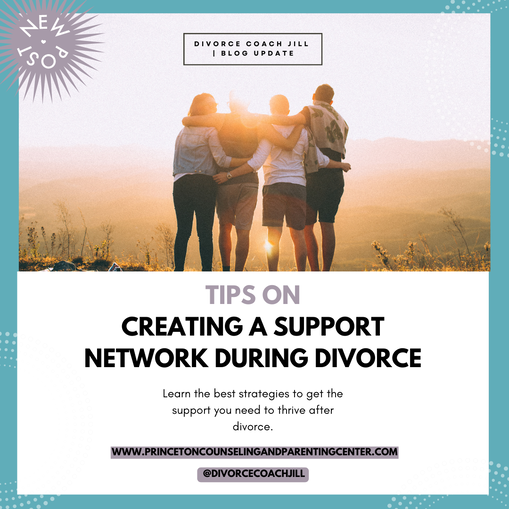|
Going through divorce can be one of the most challenging experiences of your life. It's easy to feel overwhelmed, stressed, and uncertain about what the future holds. However, it's important to remember that divorce doesn't have to mean the end of happiness. By taking proactive steps to care for yourself and your emotional well-being, it's possible to find happiness again, even during the divorce process.
One powerful tool for finding happiness during a divorce is divorce coaching. A divorce coach is a trained professional who can provide guidance, support, and resources to help you navigate the emotional and practical aspects of the divorce process. A divorce coach can help you manage your emotions, communicate effectively with your ex-spouse, and develop a plan for the future that meets your needs and goals. Here are three steps you can take to find happiness again during a divorce: 1. Take time for self-care: Divorce is a stressful and emotional experience, and it's important to take care of yourself during this time. Make time for activities that bring you joy and relaxation, such as exercise, meditation, or spending time with friends and family. 2. Focus on the positive: When going through a divorce, it's easy to get caught up in negative thoughts and emotions. Instead, focus on the positive aspects of your life and the things you are grateful for. Practicing gratitude can help shift your mindset and improve your overall well-being. 3. Develop a plan for the future: While divorce can be a difficult process, it's also an opportunity to create a new life for yourself. Take time to think about your goals and aspirations for the future, and work with a divorce coach to develop a plan that aligns with your vision. If you're going through divorce and want support and guidance to find happiness again, I can help. As a divorce coach, I offer personalized support and resources to help you navigate the challenges of divorce and create a plan for a brighter future. Contact me today to schedule a consultation and learn more about how divorce coaching can benefit you. To contact me for divorce coaching, visit my website at www.divorcecoachjill.com. You can schedule a consultation to learn more about my services and how I can help you through this challenging time. With my support and guidance, you can find happiness again during and after the divorce process. Divorce can be a difficult and lonely experience. Having a strong support network during divorce can make a world of difference. Building a support network can be tricky as people going through divorce can feel shame about the divorce and can isolate themselves. Below are several ways to create a supportive network during a divorce.
Friends and Family Your support network should include people who are understanding, non-judgmental, and have your best interests at heart. These people could include close friends, family and others in your network such as mentors or religious professionals. It’s important that you let them know what you need from them because they may not know how to help you. Do you need them to listen? Do you want advice? Do you just need them to help with the kids? Clearly communicating what would help you the most is key to having the right support around you during divorce. Community While friends and family are an important party of your support network, they may not understand what you’re going through. If they haven’t been through divorce, they probably don’t really know how overwhelming and devastating divorce is. They may say the wrong thing or be so consumed with their own feelings that they can’t support you. That’s why support groups and other divorce communities can be so helpful. There are many online and in-person divorce support groups and communities. Connecting with others going through divorce helps you recognize that you’re not the only one who’s feeling so devastated. It can help with the healing process. Listening to others stories and hearing about others who’ve survived divorce can give you hope for the future. They can share what has worked for them and what hasn’t which can help you have a better idea of how to move forward. Professional Help There are a number of divorce professionals that can help you as you go through divorce. Many people hire an attorney and let the attorney lead their divorce. That can lead to an increase in cost and conflict. Here are professionals that you can use during your divorce:
Remember, asking for help is a sign of strength, not weakness. Your divorce does not have to define who you are. It is a transition and a new chapter in your life. By creating a strong support network and taking advantage of the services of a professional such as divorce coach, you can move forward with your life in a positive and healthy way. The holiday season is supposed to be a joyful time but for many people who are going through difficulties, holidays can be tough. Divorce, loss, an illness or a marriage that’s in conflict can all make holiday time less joyful. But there are things that you can do to make the holidays better, even if you’re dealing with tough times.
1. Don’t put extra pressure on yourself There is no rule that you have to celebrate the holidays in a certain way every year. Do you like having a big celebration or would you rather do something smaller and casual? Maybe you want to watch movies, read a book or go snowshoeing. You get to decide each year how you’re going to celebrate the holiday season. You don’t have to do what you’ve done in the past. You can make new traditions based on what’s best for you. This year, take the pressure off of yourself and create memories in a different way so that you can put your feet up and relax. You deserve it! 2. Spend the holidays with who you want to spend it with You don’t have to spend the holidays with people who aren’t kind, caring and supportive of you. If you’re used to spending the holidays with family members who make you uncomfortable or who don’t really understand you, take a break from them this year. If you’re divorced and don’t have your children, find a good friend or family who you want to be with. If your in-laws are not who you want to be with, spend the time with just your immediate family. Too may times, we do things because we’ve done them in the past. This year, do what works best for you. 3. Make sure that you reach out to loved ones Many people who are struggling during the holidays don’t tell their loved ones how they feel. They may be ashamed or don’t want to bother anyone. But people who are close to you would probably want to help. They might be going through their own struggle and they would benefit from connecting with you. If you don’t have anyone you feel comfortable talking to, you can always reach out to a therapist. 4. Focus on the positives Even if times are tough there are always positive things going on in life. Every day you can watch the sunset or take a walk in nature. You have your good health or your children to focus on. You are able to walk, ride a bike and take a warm bath. There are so many small things that we take for granted that we can be grateful for. What is positive in your life? Final Thoughts When you’re going through a difficult situation, it can be hard to get through the holiday season. Make sure that you don’t put unnecessary pressure on yourself, you’re intentional with who you spend your holiday with, reach out to loved ones and focus on the positive. There are ways to turn around a holiday season that you’re dreading and make it into a positive experience for you and your family. Divorce is one of the most stressful experiences and involves complex emotional, financial and legal issues. In order to be able to think clearly through your divorce, it’s so important that you take care of your emotional self.
1. If it feels wrong, don’t do it The ability to set boundaries is crucial and can be hard, especially after separating from a long-term relationship. What do healthy boundaries look like? Not doing something that feels wrong or uncomfortable is a great starting point. If your Soon-to-be-ex (STBX) tells you to do something and you don’t feel comfortable doing it, you need to be able to let him or her know that you disagree. This doesn’t mean that you should be disrespectful, it means that you can let them know that you appreciate their perspective. But in the end, you get to decide what you want to do. 2. Stay calm when you communicate with your STBX Communication is key in any relationship, divorce included, and being calm will help you effectively communicate with your STBX. Try not to react to the emotion in the other person’s voice, this can escalate a simple conversation into an argument. Instead, recognize that you don’t have to respond right away. Take some time to breathe deeply, and think about how you want to respond. Not only will this prevent an argument, but it’s less emotionally draining on you. Lastly, if the conversation is getting escalated, remove yourself until you are both able to respond calmly. 3. Trust your instincts Your instincts are there to tell you when a boundary is being pushed too far and it’s key to listen to them. When you can feel yourself being pushed too far or being put in an uncomfortable situation, trust when that gut feeling kicks in and walk away. 4. Don’t be afraid to say “no” Sometimes we say yes because we feel intimidated or want to please others. Saying “no” helps to establish healthy boundaries and enables others to understand what to expect from you. When a situation arises, you might feel obligated to go along for the sake of agreement but if you say yes and then feel resentful, that’s not good for anyone. Learning to say no and not feel bad is key to taking care of your emotional self. 5. Let go of what you can’t control You won’t be able to control everything. There are things that may happen that are not ideal for you or your children. In most cases, everything will still turn out ok, even if it’s not exactly what you wanted. Detaching and letting go are such important skills when you’re going through divorce and will save you so much stress. If you’re struggling with this, I recommend practicing mindfulness and meditation. Caring for yourself emotionally can make a huge difference in helping you move forward through your divorce in a healthy way. When you’re able to take better care of yourself mentally and physically, your decision making will improve, you'll be able to think clearly, you’ll be able to be there for your children and you can conquer anything that comes your way! This past year has been tough and a lot of people have lost hope for a better future. But that can change by recognizing that we’re somewhat in control of our thoughts. Did you know that we have about 6,000 thoughts per day? And about 80% of them are negative! That means that we have a huge amount of negative self-talk. We spend a lot of time telling ourselves that we’re not good enough, not smart enough, not thin enough or not as good as someone else. When we do this often, it becomes a habit. We can start feeling bad about ourselves and lose hope.
The great news is that we can change these negative habits and train our minds to interpret our experiences in a more positive way. Sure, life can be HARD, but our patterns of thinking and the way we perceive the world can make it much harder than necessary. In the words of Greek Philosopher Epictetus, “We are disturbed not by things, but by what we think about things.” Therefore, if we can change the way we think, we can change the way we feel! Have you ever expected, even visualized disaster? Have you noticed or heard about a problem and started asking, “What if?” What if tragedy strikes? What if it happens to you? That way of thinking is called “catastrophizing” where we catastrophize a problem and make it worse by escalating our negative thoughts. With catastrophizing, we worry that the worst possible outcome will happen. We exaggerate the problem. When you realize you might be catastrophizing, stop and ask yourself the question, “What story am I telling myself?” It might take a moment, but get specific. For example, maybe you are telling yourself that you are ruining your kids and that you are a terrible parent and that none of you are ever going to be happy again. Whatever it is, when you force yourself outside the thoughts and examine them, it becomes apparent how dramatic your story has become. After identifying the story you’re telling yourself, ask yourself, “What other story could be true?” This is where you use your logical brain and reference facts. An example of this would be, “Patty went through a divorce and it was so hard, but her children are all doing well and she moved on with her life and is thriving. That can happen for me, too.” When you identify the negative thoughts, and replace them with positive ones, you’ll feel better. If you think you are a good person who deserves to be happy, you’ll create a happy life. You’ll see possibilities for the future and have hope. While using these techniques takes mindfulness and work, it’s worth it as it can give you a tool to start the new year off in a great place. Positive affirmations have been shown to reduce stress. The following six mantras can be a powerful tool to reduce stress. Take deep breaths as you say the following:
Studies have shown that some people are inherently more grateful than others. People are born with a proclivity towards many different things and being grateful is one of them. It may have to do with a person's temperament and their ability to be tolerant - some people are more tolerant of everyday hassles such as difficulty finding parking, long waits for help on the phone, etc. The people who are more tolerant of everyday hassles are also more grateful for everyday blessings such as seeing the sunset through the clouds, the right to vote, a quiet moment, etc.
The good news is that being grateful is something that can be learned. If you can incorporate more gratitude into your life, you will be happier, more fulfilled and more peaceful. How do you incorporate gratitude into your life? One way is to keep a gratitude journal. A gratitude journal is simply a journal where you write one thing that you're grateful for every day. Writing what you're grateful for everyday helps you focus on the positive things in your life so that you can develop a grateful focus. Becoming more grateful has tangible benefits. In 1,000 people studied, the people who kept a gratitude journal had psychological, physical and social benefits. They felt more alert and alive. In addition, they felt less bothered by aches and pains, they exercised more and they had a 10% increase in sleep duration. There was also an improvement in blood pressure! Socially, they felt more outgoing, less lonely and more compassionate. In addition, children who wrote in gratitude journals showed an increase in their GPA. A gratitude journal is just one way to become more grateful. What other ways can you come up with to become more grateful? There's a blizzard in New Jersey this morning. The shopping centers were packed last night with people scrambling to buy milk, bread, eggs - everything they could possibly need in case they were stuck in their homes for a while. But this morning it's quiet. There is not a car on the road. Normally, most people are pulled in so many directions with an overwhelming amount of responsibilities. But today you can't get errands done, you can't go to work, you can't really do anything. This gives us a rare chance to do the things that we can't do very often. Relax, take a nap, talk to family, breathe, play a game, bake cookies, have tea, read. Take advantage of the blizzard - be in the moment and appreciate the moment.
If you are in another part of the country where there isn't a blizzard, take a blizzard day! We all need those days where we get nothing accomplished because it is what helps us to be effective during the rest of the days. Don't feel guilty or pressure to get something done. Recognize that you deserve it, we all do. If you can't take the whole day, a part of the day will do. Don't wait for a blizzard, they don't come very often. Take a blizzard day today! New Year's Resolutions are common - "I'm going to lose 10 pounds", "I'm going to eat all organic, gluten-free foods", "I'm going to be nicer to people". Many times resolutions are somewhat unrealistic. And most likely the reason people create resolutions is that they have the underlying thought - "I'm not good enough." This thought of not being good enough is most likely a result of low self-esteem. In order to feel good about ourselves, we need to actively be aware of our internal messages. Say to yourself, "I like the way I am."
Instead of creating resolutions in the new year, create realistic, attainable goals. You can have goals every day, every month or even every quarter. If you don't meet some of your goals, don't get discouraged. They can be re-evaluated every so often to see if they are realistic. Here's a good example of attainable goals: Goals for January: 1. Find a charity or organization that I would like to become involved in. 2. Eat at least one vegetable per day. 3. Spend one day with a good friend doing something fun. 4. Network with one group for my business. Be sure to include taking care of yourself in your goals. It's really important when you are planning your time to schedule in something that will make you feel cared for. Most people forget to include that in their schedule and if it's not a priority, it may not get done. What can you do so that you feel taken care of? The holiday season brings a tremendous amount of stress as we are either incredibly busy or feeling somewhat lonely. Many people don't have as strong support systems as they need and it becomes very obvious during the holidays due to the messages that we receive from the media. If your life doesn't look like some picture perfect holiday card then you feel like a failure. These perfect pictures are usually unrealistic. Here are some tips to make it a non-stressful holiday season:
1. Slow down - our society moves quickly. There is so much to do and we feel that if we aren't accomplishing something we're waisting time. Say no to an invitation. Shut off all screens. Sometimes we need to take a break and breathe. 2. Acknowledge your feelings - know that feeling anxious or sad is normal and allow yourself to feel those feelings. Express them in a journal or to a close friend. 3. Look for the positive - if you don't have an extended family or support system, find the people who are there for you. Recognize that you do have people who care about you and who you care about. 4. Reach out - contact others in the community or in religious or other groups. There are others who are waiting to connect with you and will help you get through this time. 5. Spend time in nature - nature can be healing and if you're feeling stressed or depressed, getting out in the sun can be just what the doctor ordered. Sunlight stimulates the production of the feel good serotonin. 6. Make time for yourself - take a walk, listen to music, take a yoga class, take a bubble bath. Spend time with someone who makes you laugh. Do things to take care of yourself so that you can truly enjoy this time of year. |
AuthorJill Barnett Kaufman, MSW, LCSW and Certified Parent Educator is an experienced clinician who helps clients discover new ways to resolve a variety of challenges and bring more happiness and peace into their lives. Archives
November 2023
Categories
All
|
|
If you are in crisis or in need of emergency assistance, please call 911. |
|










 RSS Feed
RSS Feed


